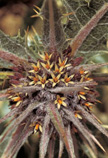

Closeup of tumbleweed with flowers, near Makawir, Jordan, the site of King Herod’s palace.
TUMBLEWEED OR GUNDELIA TOURnefortii is a common plant in the steppe regions of Bible lands. It is mentioned in the Bible: “Make them like tumbleweed [Hebrew galgal], O my God, like chaff before the wind” (Psalm 83:13, NIV). Some scholars think that the tumbleweed in this verse is akoub, an Arabic name designating a heavily armed plant, a true thistle.
The scriptures refer to the tumbling nature of the plant, which is similar in behavior to the famous tumbleweeds of the American Great Plains (Salsola kali and other species), which, when mature, break from their roots and dry, then roll along the landscape carried by the wind.
In the Middle East, in March, akoub plants are cut at the base and the prickles removed. The disarmed plants are relished as a delicacy that is cooked with meat or sauteed with oil and onions. After purchasing some akoub, tediously I removed the young but strong prickles with scissors. Then, I cooked it with a little olive oil. The flavor resembled mild broccoli. Like many wild foods, the appeal is in its wild origin and lore more than in its flavor. Harvesting has become so widespread that measures are being taken to protect the plant in Israel (Kaplan et al. 1995). After my experience preparing the delicacy with resultant bloody hands from the vicious spines and only a few strands to eat, I pose no threat to existing populations of akoub.
I purchased this box of akoub from a young Bedouin boy selling it along the road near Jerash, Jordan.
By mid May, the akoub stem has separated from the root, allowing the entire plant to tumble, carried by the wind. Near Makawir, the location of Herod’s palace east of the Jordan River and the likely site of the decapitation of John the Baptist, I found abundant akoub. As the thistle tumbles over the open ground, the fruits fall out. Akoub’s dispersal takes place about the same time as wheat harvest, “driven before the wind like chaff on the hills, like tumbleweed before a gale” (Isaiah 17:13, NIV).
Tumbleweed may not be the most desirable way to translate this plant because it is then likened to the well-known tumbleweeds of America’s Great Plains. While ambulatory like its prairie counterpart, akoub has a different mechanism of separating from its base, and belongs to an unrelated family.